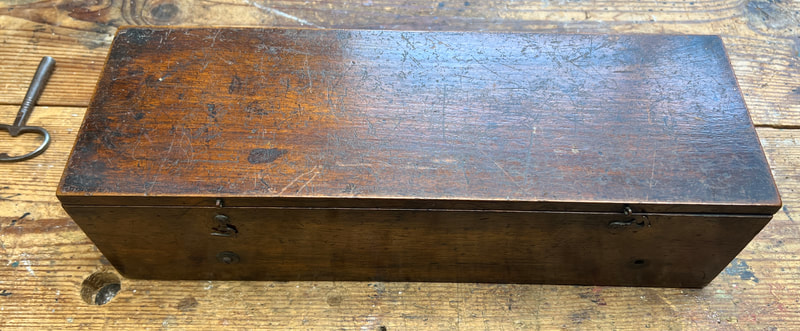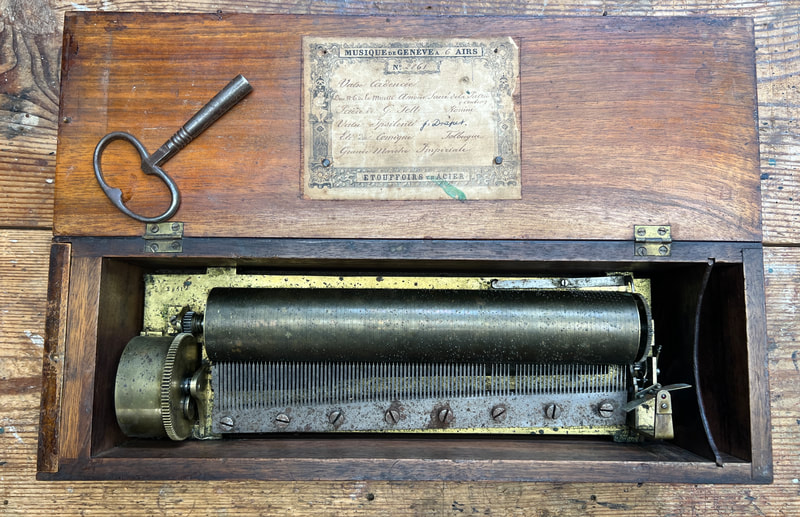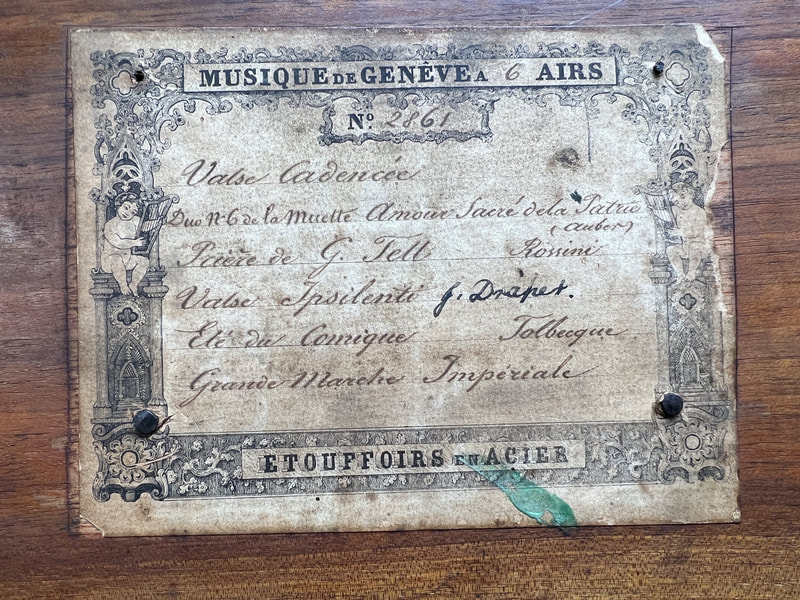6/103 keywind cartel by unattributed maker - circa 1830
Bought from a private seller via eBay in October 2023.
Unusual rare tune sheet, intact, but glued to the inside of the lid.
Anthony Bullied's publication shows a similar tune sheet (no 259) for serial no. 6216, as unattributed.
There is little doubt that the maker was based in Geneva as stated by the term Musique de Genève, widely used from abut 1830 to 1860. The serial no. of this movement is 2861 so probably made sometime just after 1830.
June 2024, now with The Musicbox Restorer for teeth and damper repairs.
See it in the workshop
Unusual rare tune sheet, intact, but glued to the inside of the lid.
Anthony Bullied's publication shows a similar tune sheet (no 259) for serial no. 6216, as unattributed.
There is little doubt that the maker was based in Geneva as stated by the term Musique de Genève, widely used from abut 1830 to 1860. The serial no. of this movement is 2861 so probably made sometime just after 1830.
June 2024, now with The Musicbox Restorer for teeth and damper repairs.
See it in the workshop
Tune 1 - Valse Cadencée - Possibly by Auber. See Tune 2?
The word Cadencée, means a cadence, which is a sort of exciting ending suggesting that the waltz has a series of such endings in the music and dance.
The word Cadencée, means a cadence, which is a sort of exciting ending suggesting that the waltz has a series of such endings in the music and dance.
Tune 2 - Duo no. 6 Muette Amour Sacré dela Patrie (Sacred Love of the Homeland) by Daniel François Auber (1782 - 1871) Grand Opera La Muette de Portici, (the dumb girl of Portici) written in 1828, was welcomed as a new Marseillaise; its performance at Brussels on 25 August 1830, in which the duet 'Amour sacré de la patrie' sung by tenor Jean-François Lafeuillade and the baritone Cassel, engendered a riot that became the signal for the Belgian Revolution that drove out the Dutch. La Muette broke ground also in its use of a ballerina in a leading role (the eponymous mute), and includes long passages of mime music.
Tune 3 - Priere de Guilliame Tell - Rossini (Prayer of William Tell)
Guillaume Tell is a French-language opera in four acts by Italian composer Gioachino Rossini to a libretto by Victor-Joseph Étienne de Jouy and L. F. Bis, based on Friedrich Schiller's play William Tell, which, in turn, drew on the William Tell legend. The opera was Rossini's last, although he lived for nearly 40 more years. Fabio Luisi said that Rossini planned for William Tell to be his last opera even as he composed it. The often-performed overture in four sections features a depiction of a storm and a vivacious finale, the "March of the Swiss Soldiers". It was first performed by the Paris Opéra at the Salle Le Peletier on 3 August 1829.
Guillaume Tell is a French-language opera in four acts by Italian composer Gioachino Rossini to a libretto by Victor-Joseph Étienne de Jouy and L. F. Bis, based on Friedrich Schiller's play William Tell, which, in turn, drew on the William Tell legend. The opera was Rossini's last, although he lived for nearly 40 more years. Fabio Luisi said that Rossini planned for William Tell to be his last opera even as he composed it. The often-performed overture in four sections features a depiction of a storm and a vivacious finale, the "March of the Swiss Soldiers". It was first performed by the Paris Opéra at the Salle Le Peletier on 3 August 1829.
Tune 4 - Valse Ipsilenti - G Draper
Extensive research has drawn a blank on this tune and composer.
Extensive research has drawn a blank on this tune and composer.
Tune 5 - Eté du Cornique - Tolbecque
The title means Cornish Summer. The Tolbeques were a family of Belgian musicians who settled in France after the Restoration. The original members were four brothers:—the eldest was composer/violinist Isidore Joseph (1794-1871) as was his brother Jean Baptiste Joseph 1797-1869). The third brother was Charles Joseph (1806-1835) also a composer. I suppose any one of them could be the composer.
The title means Cornish Summer. The Tolbeques were a family of Belgian musicians who settled in France after the Restoration. The original members were four brothers:—the eldest was composer/violinist Isidore Joseph (1794-1871) as was his brother Jean Baptiste Joseph 1797-1869). The third brother was Charles Joseph (1806-1835) also a composer. I suppose any one of them could be the composer.
Tune 6 - Grande Marche Imperiale
This will be the 1812 invasion of Russia by Napoleon Edouard. Composer is unknown.
This will be the 1812 invasion of Russia by Napoleon Edouard. Composer is unknown.


